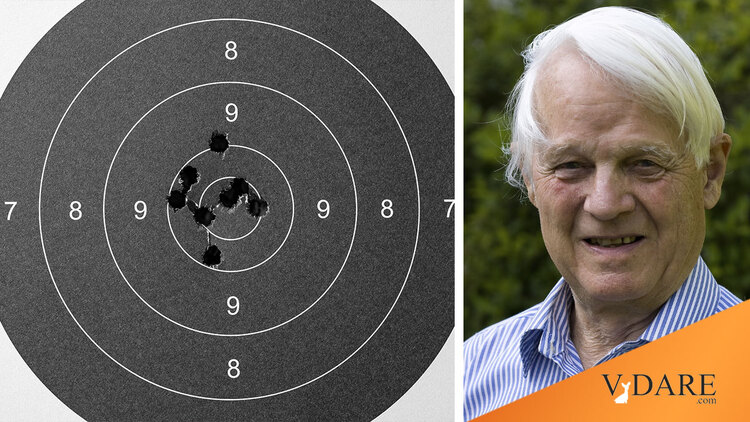
Richard Lynn And Sailer’s Law
07/20/2023

I tweeted about this in May, but the recent death of Richard Lynn brought it to mind again. In 2017, I wrote that one of the reasons for differential marksmanship abilities between races, aka Sailer’s Law, which leads to black mass shootings with 14 wounded and no dead, is IQ.
I wrote that “Some of the principles behind marksmanship involve geometry, which is why a fraction of an inch off in your sights is three feet off downrange.”
Recently a study was published proving this:
The "g" in "general intelligence" stands for that first word "general".
g can be measured with and predicts performance in practically any cognitively involved task including … firearm accuracy. https://t.co/3AwpClUz4j pic.twitter.com/ptowFbcPNE
— Crémieux (@cremieuxrecueil) May 27, 2023
Richard Lynn had experience with this in 1949, as young National Service officer in Britain. All the soldiers he would have been training were white, but they were divided into officers and enlisted (”other ranks” in British terminology) by … standardized tests.
At this time all 18 year olds were conscripted into the armed services and in July, 1949, I received my call-up papers requiring me to report for military service. It was not a future to which I particularly looked forward. Remarkably, the Army decided I would make a good officer and I was duly commissioned second lieutenant.
I was put in charge of the training of new conscripts. One of the things I had to do was to teach them how to use a rifle. I had never found any difficulty in this, but I was surprised to find that the new conscripts found this very hard. Generally they failed to hit the target at all. I used to give them a demonstration of how it was done, and the sergeant would bring the target and show it to them with five neat little holes in the bull’s eye. They would gather round with exclamations of “Cor, blimey, look at the officer’s”! I realised later that this apparently simple task must be g loaded.
That’s why IQ is important, and it’s unknown to, among others, judges who decide on “disparate impact” cases.
